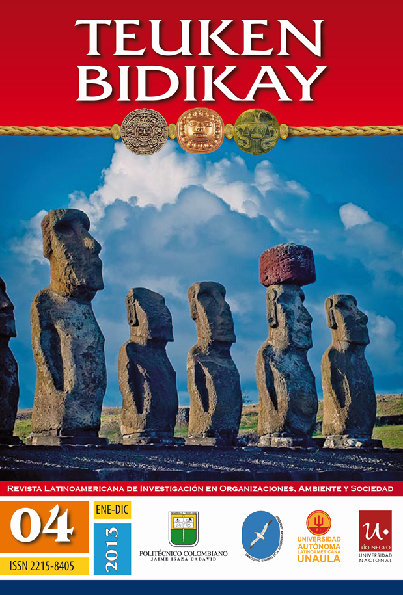Innovación, tecnología y desarrollo sustentable: La adopción de un nuevo paradigma para el sector turismo
Palabras clave:
paradigma tecno-económico, sustentabilidad, oportunidades, innovaciones, industria del turismo, paradigmasResumen
Existen tendencias sociales y económicas que sustentan las proposiciones históricas de Carlota Pérez sobre las revoluciones tecnológicas y los paradigmas tecno-económicos, tales como la difusión de nuevas tecnologías, cambios en las organizaciones, mano de obra, inversiones, productos, innovaciones o clientes para adaptarse y enfrentar con éxito los períodos de crisis. Nuestro tiempo caracterizado por una crisis inusual, profunda y extendida a nivel mundial, puede estar señalando que el paradigma de la tecnología de información se acerca a su fase de implementación mientras que se está gestando una nueva revolución. Hay señales de alerta por todas
partes anunciando el surgimiento del paradigma de la sustentabilidad. Este artículo apuesta por el sector turístico para proporcionar datos sobre los cambios técnicos, económicos y sociales que están guiando este proceso de transformación y trata de llamar la atención sobre las ventanas de oportunidad abiertas a nuevos participantes como una forma de desarrollo de las regiones, destinos, comunidades y empresarios.
Métricas de artículo
Resumen: 562 PDF: 313Citas
ASHLEY, C., DE BRINE, P., LEHR, A. and WILDE, H. (2007). The role of the Tourism Sector in Expanding Economic Opportunity. Corporate Social Responsibility Initiative Report No. 23. Cambridge, MA. Kennedy School of Government, Harvard University.
BATLLORI G., Alicia (2005). Perspectiva educativa ambiental del turismo cultural y alternativo en México. Boletín de los Sistemas Nacionales Estadísticos y de Información Geográfica del INEGI, Vol. I (1), mayoagosto: 52-65.
BLAKE, A., SINCLAIR, M. T., & SORIA, J. A. C. (2006). Tourism productivity: evidence from the UK. Annals of Tourism Research, 33(4), 1099-1120.
BLANKE, J. y CHIESA, T. (2011). Executive Summary. The Travel & Tourism Competitiveness Report 2011. Beyond the Downturn. World Economic Forum, Génova, pp. xiii
BUCKLEY, R. (2012). Sustainable Tourism: Research and Reality. Annals of Tourism Research, 39:528-546; doi:10.1016/j.annals.2012.02.003
COCKERELL, N. y GOODGER, D. (2011). Investment: A Key Indicator of Competitiveness. The Travel & Tourism Competitiveness Report 2011. Beyond the Downturn, World Economic Forum, pp. 69-76.
COLBY, M. y SAGASTI, F. (1992). “Ecodevelopment and Pespectives on Global Change from Developing Countries”; en Choueri, N.(ed.) Global Change: Environmental Challenges and International Responses, MIT Press, Cambridge.
CREST (2009). El mercado de productos de turismo responsable en América Latina y Nepal. Center for Responsible Tourism. SNV. La Haya, Países Bajos.
ESTRADA, S. y MARTÍN, L.M. (2014). Innovación y Desarrollo de Estrategias de Sustentabilidad. (Mimeo).
FREEMAN, C. y PÉREZ, C. (1988). Structural crises of Adjustment: Business Cycles and Investment Behaviour, en Dosi, G., Freeman, C., Nelson, R., Silverberg, G. y Soete, L. (eds.) Technical Change and Economics Theory, Pinter, Londres.
GARZA, G. y SOBRINO, J. (coords) (2009) Evolución del sector servicios en ciudades y regiones de México, El Colegio de México, México.
GEORGE, G. (2013). Entrepreneurship in Renewable Energy. En https:// workspace.imperial.ac.uk/energyfutureslab/Public/Forms/AllItems.aspx consultado el 24 de octubre de 2013-.
GONZÁLVEZ PÉREZ, V. (2010). La producción ecológica como fuente de empleo. Cuadernos Mercado de Trabajo. No. 4, pp.71-77.
HALL, C. M., GÖSSLING, S., & WEAVER, D. B. (2008). Sustainable tourism futures: perspectives on systems, restructuring and innovations. In S. GÖSSLING, C. M. HALL, & D. B. WEAVER (Eds.), Sustainable tourism futures: Perspectives on systems, restructuring and innovations (pp. 1–18). London: Routledge.
HJALAGER, A.-M. (1997). Innovation patterns in sustainable tourism – an analytical typology. Tourism Management, 18(1): 35–41.
HJALAGER, A.-M. (2010). A review of innovation research in tourism. Tourism Management, 31, 1–12
LI, L. (2008). A review of entrepreneurship research published in the hospitality and tourism management journals. Tourism Management, 29: 1013–1022.
LIBURD, J. J. (2005). Sustainable tourism and innovation in the mobile tourism services. Tourism Review International, 9(1), 107–118.
LIPMAN G. y VORSTER S. (2011). Green Growth, Travelism, and the Pursuit of Happiness. The Travel & Tourism Competitiveness Report 2011. World Economic Forum, Génova, pp. 77-80.
MAGAÑA-CARRILLO, I. (2009). La política turística en México desde el modelo de calidad total: un reto de competitividad. Economía, Sociedad y Territorio, Vol. IX, Núm. 30, mayo-agosto: 515-544.
MARTINOT, E., CHAUREY, A., LEW, D., MOREIRA & WAMUKONYA, N. (2002). Renewable Energy Markets in Developing Countries. Annu. Rev. Energy Environ., 27: 309–48
MOSCARDO, G. (2008). Sustainable tourism innovation: Challenging basic assumptions. Tourism and Hospitality. Research, 8 (1): 4–13.
NOVELLI, M., SCHMITZ, B., & SPENCER, T. (2006). Networks, clusters and innovation in tourism: a UK experience. Tourism Management, 27(6), 1141–1152.
OPTI (2005). Estudio de Prospectiva del Sector Turismo. Escenarios de demanda global y tendencias tecnológicas. Fundación OPTI-ANIA, Madrid, 75 pp.
PÉREZ, C. (2001). Cambio tecnológico y oportunidades de desarrollo como blanco móvil. Revista de la CEPAL 75, diciembre: 115-136.
PEETERS, P., GÖSSLING, S., & BECKEN, S. (2006). Innovation towards tourism sustainability: climate change and aviation. International Journal of Innovation and Sustainable Development, 1(3), 184–200.
REN21. 2013. Renewables 2013 Global Status Report. Renewable Energy Policy Network for the 21st Century Secretariat, Paris.
Redes Consultores, (2000). Estudio de Gran Visión del Turismo en México: Perspectiva 2020, CESTUR/SECTUR, México, DF. 174 pp. En http:// observatoriodelacapacitacion.stps.gob.mx/oc/pdf/6_estudio_gran_ vision_del_turismo_en_mexico_perspectiva_2020.pdf consultado el 14 de diciembre de 2009.
RIFKIN, J. (2000). La era del acceso. La revolución de la nueva economía. Editorial Paidós. Barcelona.
RILEY, C. (1983). New product development in Thomson Holidays UK. Tourism Management, 4(4), 253–261.
SANTAMARTA FLÓREZ, José. (2000). Turismo y medio ambiente. Revista World Watch, 11, pp. 52-55, en http://www.nodo50.org/worldwatch/ ww/htm/00-20.htm, consultado 13 de octubre de 2011.
SCHWEINSBERG, S.; WEARING, S.L. and MCMANUS, P. (2013). Exploring sustainable tourism education in business schools: The honours program. Journal of Hospitality and Tourism Management 20, pp. 53-60
SECTUR (2001). Impacto de las nuevas tecnologías en el turismo mexicano: presentación ejecutiva. SECTUR/CESTUR , México, DF, 44 pp.
SEPE (2012). Características Sociodemográficas y Perfiles Competenciales de los Trabajadores del Sector Turismo. Servicio Público de Empleo Estatal. Subdirección General de Estadística e Información. Área de Organización y Planificación de la Gestión. Observatorio de las Ocupaciones. Ministerio de Trabajo e Inmigración. Gobierno de España, 345 pp.
STAMBOULIS, Y. & SKAYANNIS, P. (2003). Innovation strategies and technology for experience-based tourism. Tourism Management, 24(1), 35–43.
TEPELUS, C.M. y CASTRO-CÓRDOBA, R. (2005). Recognition schemes in tourism—from ‘eco’ to ‘sustainability’? Journal of Cleaner Production 13, 135–140.
TRIP (2013). Thematic Research Summary: Passenger Transport. Communicating Transport Research and Innovation. Transport Research and Innovation Portal (TRIP) consortium on behalf of the European Commission’s Directorate-General for Mobility and Transport (DG MOVE).
UNCTAD (2007). FDI in Tourism: The Development Dimension. UNCTAD Division on Investment, Technology and Enterprise Development. Génova y Nueva York.
UNWTO (2011). Tourism Towards 2030. Global Overview. World Tourism Organization. Madrid.
UNWTO (2013). Tourism Highlights, 2013 Edition. World Tourism Organization. Madrid.
Wenzel, E.; Kirig, A. y Rauch, C. (2009). Greenomics: ¡la economía se está volviendo verde! Grupo Editorial Patria. México, DF. 205 pp.
WWT (2013). Travel & Tourism Economic Impact 2013. World Travel & Tourism Council.





















